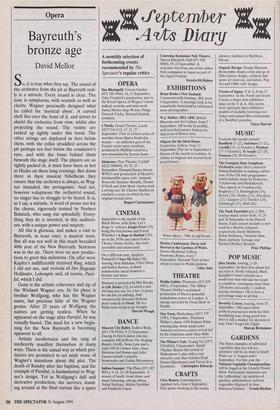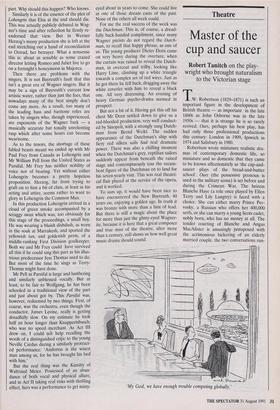O p er a
Bayreuth's bronze age
David Mellor
So, it is true what they say. The sound of the orchestra from the pit at Bayreuth real- ly is a miracle. Every strand is clear. The tone is sumptuous, with warmth as well as clarity. Wagner personally designed what he called his 'mystical abyss'. A curved shell lies over the front of it, and serves to shield the orchestra from view, whilst also projecting the sound. The violins are tucked up tightly under this hood. The other strings are deployed in tiers below them, with the cellos straddled across the pit perhaps ten feet below the conductor's eyes, and with the brass behind them beneath the stage itself. The players are so tightly packed in, it must have been as hot as Hades on these long evenings. But down there in their musical Nibelheirn they ensure that the orchestra is always, as Wag- ner intended, the protagonist. And yet, however voluptuous the orchestral sound, no singer has to struggle to be heard. It is, as I say, a miracle. A word of praise too for the chorus, rigorously trained by Norbert Balatsch, who sang out splendidly. Every- thing they do is invested, in this auditori- um, with a unique power and majesty.
All this is glorious, and makes a visit to Bayreuth, at least once, a musical must. But all was not well in this much heralded 40th year of the New Bayreuth. Staleness was in the air. There were no new produc- tions to greet this milestone. On offer were Kupfer's indifferently received Ring, which I did not see, and revivals of Der fliegende Hollander, Lohengrin and, of course, Parsi- fal, which I did.
Gone is the artistic coherence and zip of the Wieland Wagner era. In his place is brother Wolfgang, who has the Wagner name, but precious little of the Wagner genius. After 25 years of Wolfgang the natives are getting restless. When he appeared on the stage after Parsifal, he was roundly booed. The need for a new begin- ning for the New Bayreuth is becoming apparent to all.
Artistic incoherence and the tang of mediocrity manifest themselves in many ways. There is the casual way in which pro- ducers are permitted to set aside some of Wagner's intentions about the plot. The death of Kundry after her baptism, and the triumph of Parsifal, is fundamental to Wag- ner's design. Yet in Wolfgang's dull and derivative production, she survives, stand- ing around at the final curtain like a spare part. Why should this happen? Who knows.
Similarly it is of the essence of the plot of Lohengrin that Elsa at the end should die. This was actually publicly debated in Wag- ner's time and after reflection he firmly re- endorsed that view. But in Werner Herzog's messy production she is left at the end stretching out a hand of reconciliation to Ortrud, her betrayer. What a nonsense this is: about as sensible as some crazed director letting Romeo and Juliet live to go on a fortnight's honeymoon in Majorca.
Then there are problems with the singers. It is not Bayreuth's fault that this isn't a great era of Wagner singers. But it may be a sign of Bayreuth's current low artistic water, rather than just the fees, that nowadays many of the best simply don't come any more. As a result, too many of the leading bass and baritone roles are taken by singers who, though experienced, are exponents of the Wagner bark — a musically accurate but tonally unrelenting rasp which after some hours can become wearisome.
As to the tenors, the shortage of these fabled beasts meant we ended up with Mr Paul Frey from Canada as Lohengrin and Mr William Pell from the United States as Parsifal. Mr Frey has neither nobility of voice nor of bearing. Yet without either Lohengrin becomes a pretty hopeless proposition. Herzog, far from trying to graft on to him a bit of class, at least in his acting and attire, seems rather to want to glory in Lohengrin the Common Man.
In this production Lohengrin arrived in a cloud of green smoke accompanied by a scraggy swan which was, too obviously for this stage of the proceedings, a small boy. He was wearing a bluish dishdash, as worn in the souk at Marrakesh, and sported the yellowish tan, and goldenish perm, of a middle-ranking First Division goalkeeper. Both we and Mr Frey could have survived all this if he could sing this part as his illus- trious predecessor Jess Thomas used to do. But most of the time he sings as Terry- Thomas might have done.
Mr Pell as Parsifal is large and lumbering and similarly unblessed vocally. But at least, to be fair to Wolfgang, he has been schooled in a traditional view of the part and just about got by. This Parsifal was, however, redeemed by two things. First, of course, was the orchestra, even though the conductor, James Levine, really is getting dreadfully slow. On my estimate he took half an hour longer than Knappertsbusch, who was no speed merchant. As Act III drew on, I could- not help recalling the words of a distinguished critic to the young Neville Cardus during a similarly protract- ed performance: `Amfortas is the wisest man among us, for he has brought his bed with him.'
But the real thing was the Kundry of Waltraud Meier. Possessed of an abun- dance of both vocal and physical allure, and in Act II taking real risks with thrilling effect, hers was a performance to get misty-
eyed about in years to come. She could live in one of those dream casts of the past. None of the others all week could.
For me the real success of the week was the Dutchman. This is, of course, a dread- fully back-handed compliment, since many Wagner purists do not regard the Dutch- man, to recall that happy phrase, as one of us. The young producer Dieter Dorn came on very heavy during the overture, when the curtain was raised to reveal the Dutch- man, in overcoat and trilby, looking like Harry Lime, climbing up a white triangle towards a complex set of red wires. Just as he got there he fell back, dragging away the white coverlet with him to reveal a black one. All very distressing. An evening of heavy German psycho-drama seemed in prospect.
But not a bit of it. Having got this off his chest Mr Dorn settled down to give us a red-blooded production, very well conduct- ed by Sinopoli, with a strongly sung Dutch- man from Bernd Weikl. The sudden appearance of the Dutchman's ship with fiery red silken sails had real dramatic power. There was also a chilling moment when the Dutchman's grey, reptilian sailors suddenly appear from beneath the raised stage and contemptuously toss the recum- bent figure of the Dutchman on to land for his seven-yearly visit. This was real theatri- cal flair placed at the service of the opera, and it worked.
To sum up, it would have been nice to have encountered the New Bayreuth, 40 years on, enjoying a golden age. In truth it was bronze with more than a hint of lead. But there is still a magic about the place for more than just the glinty-eyed Wagner- ite, because it is here that a great composer and true man of the theatre, after more than a century, still shows us how well great music drama should sound.











































 Previous page
Previous page